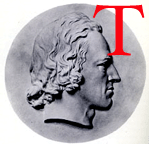 hroughout much of In Memoriam, Tennyson expresses a sense of helplessness and insignificance brought on by the death of his dear friend. His faith shaken, he attempts to reconcile the fragility of life with the tenets he had learned about God and life. Trying to understand how, despite God's love, terrible loss can occur, Tennyson separates God from Nature and blames the latter for the unfairness of life.
hroughout much of In Memoriam, Tennyson expresses a sense of helplessness and insignificance brought on by the death of his dear friend. His faith shaken, he attempts to reconcile the fragility of life with the tenets he had learned about God and life. Trying to understand how, despite God's love, terrible loss can occur, Tennyson separates God from Nature and blames the latter for the unfairness of life.
"Thou makest thine appeal to me:
I bring to life, I bring to death"
The spirit does but mean the breath"
I know no more." And he, shall he,
Man, her last work, who seemed so fair,
Such splendid purpose in his eyes,
Who rolled the psalms to wintry skies,
Who built him fanes of fruitless prayer,
Who trusted God was love indeed
And love Creation's final law —
Though Nature, red in tooth and claw
With ravine, shrieked against his creed —
Who loved, who suffered countless ills,
Who battled for the True, the Just,
Be blown about the desert dust,
Or sealed within the iron hills?
In this passage, Tennyson pits a cold and heartless Nature against a trusting, suffering Man. By enumerating Man's many merits and pains, then asking about his final fate, Tennyson creates a pleading tone. He artfully contrasts man's "splendid purpose" and a description of how Man "trusted," "loved," "suffered," and "battled," with the cruel image of Nature's red "tooth and claw," of "” dust" and "iron hills." Clearly, Tennyson is seeking to understand Man's role and power while on earth as it relates to the divine, but is having trouble finding a solution that pleases him.
Questions
1. How does the God presented in this poem compare to the God presented in Rabbi Ben Ezra?
2. How does this poem's tone compare to that of later poems within "In Memoriam"? How does the representation of God or Man's relationship to God show the evolution of Tennyson's feelings?
3. How does Tennyson use words relating to nature and the body in his descriptions of both Nature and Man and to what effect?
4. In this poem Tennyson gives Nature credit for creating Man but attributes "Creation's final law" to God. Where exactly does Tennyson draw the line between God and Nature?
Related Material
- Faith and Love as the Product of Grief
- Hope in Nature (section 2)
- Illustrative Emotion (sections 2, 95)
- Reconciling the Permanence and Transience of Life (Sections 50, 54)
- Unanswered Questions (In Memoriam 51)
Last modified 8 February 2009